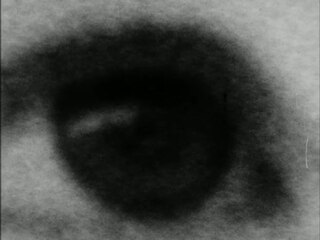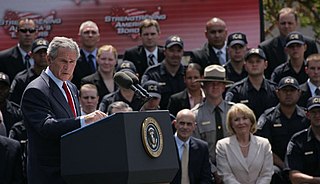
The Republican Party, also known as the GOP, is one of the two major contemporary political parties in the United States. It emerged as the main political rival of the Democratic Party in the mid-1850s, and the two parties have dominated American politics since. The GOP was founded in 1854 by anti-slavery activists who opposed the Kansas–Nebraska Act, which allowed for the potential expansion of chattel slavery into the western territories. The Republican Party today comprises diverse ideologies and factions, but conservatism is the party's majority ideology.

The State of the Union Address is an annual message delivered by the president of the United States to a joint session of the United States Congress near the beginning of most calendar years on the current condition of the nation. The State of the Union Address generally includes reports on the nation's budget, economy, news, agenda, progress, achievements and the president's priorities and legislative proposals.

A political campaign is an organized effort which seeks to influence the decision making progress within a specific group. In democracies, political campaigns often refer to electoral campaigns, by which representatives are chosen or referendums are decided. In modern politics, the most high-profile political campaigns are focused on general elections and candidates for head of state or head of government, often a president or prime minister.

Marquette University is a private Jesuit research university in Milwaukee, Wisconsin. Established by the Society of Jesus as Marquette College on August 28, 1881, it was founded by John Martin Henni, the first Bishop of the diocese of Milwaukee, Wisconsin. Initially an all-male institution, Marquette became the first coeducational Catholic university in the world in 1909.

Herman Cain was an American businessman and Tea Party movement activist in the Republican Party. Born in Memphis, Tennessee, Cain grew up in Georgia and graduated from Morehouse College with a bachelor's degree in mathematics. He then earned a master's degree in computer science at Purdue University while also working full-time for the U.S. Department of the Navy. In 1977, he joined the Pillsbury Company where he later became vice president. During the 1980s, Cain's success as a business executive at Burger King prompted Pillsbury to appoint him as chairman and CEO of Godfather's Pizza, in which capacity he served from 1986 to 1996.
Mass communication is the process of imparting and exchanging information through mass media to large population segments. It utilizes various forms of media as technology has made the dissemination of information more efficient. Primary examples of platforms utilized and examined include journalism and advertising. Mass communication, unlike interpersonal communication and organizational communication, focuses on particular resources transmitting information to numerous receivers. The study of mass communication is chiefly concerned with how the content and information that is being mass communicated persuades or affects the behavior, attitude, opinion, or emotion of people receiving the information.

Kathleen Hall Jamieson is an American professor of communication and the director of the Annenberg Public Policy Center at the University of Pennsylvania. She co-founded FactCheck.org, and she is an author, most recently of Cyberwar, in which she argues that Russia very likely helped Donald J. Trump become the U.S. President in 2016.

In politics, campaign advertising is advertising through the media to influence a political debate and, ultimately, voters. Political consultants and political campaign staff design these ads. Many countries restrict the use of broadcast media to broadcast political messages. In the European Union, many countries do not permit paid-for TV or radio advertising for fear that wealthy groups will gain control of airtime, making fair play impossible and distorting the political debate.

Christopher Cole Mooney is an American journalist and author of four books including The Republican War on Science (2005). Mooney's writing focuses on subjects such as climate change denialism and creationism in public schools, and he has been described as "one of the few journalists in the country who specialize in the now dangerous intersection of science and politics." In 2020 he was awarded a Pulitzer Prize for a series of articles on global warming published in The Washington Post.
The Democratic Party of the United States is a big tent party composed of various factions. The four most prominent modern factions are the liberals, moderates, progressives, and conservatives. The liberal faction supports modern liberalism and social liberalism that began with the New Deal in the 1930s and continued with both the New Frontier and Great Society in the 1960s. The moderate faction supports Third Way politics that includes center-left social policies and center-right fiscal policies. The progressive faction supports social democracy and left-wing populism. The conservative faction supports centre-right policies. The traditional conservative Democratic faction lost much of its influence in the 21st century as the South realigned towards the Republican Party, though a subsequent realignment starting in the 2010s brought a new set of moderate to conservative voters disillusioned with Trumpism in the Republican Party, prominently including many suburban women, into the Democratic tent.

Science communication encompasses a wide range of activities that connect science and society. Common goals of science communication include informing non-experts about scientific findings, raising the public awareness of and interest in science, influencing people's attitudes and behaviors, informing public policy, and engaging with diverse communities to address societal problems. The term "science communication" generally refers to settings in which audiences are not experts on the scientific topic being discussed (outreach), though some authors categorize expert-to-expert communication as a type of science communication. Examples of outreach include science journalism and health communication. Since science has political, moral, and legal implications, science communication can help bridge gaps between different stakeholders in public policy, industry, and civil society.

Political communication is a subfield of communication and political science that is concerned with how information spreads and influences politics, policy makers, the news media, and citizens. Since the advent of the World Wide Web, the amount of data to analyze has exploded and researchers are shifting to computational methods to study the dynamics of political communication. In recent years, machine learning, natural language processing, and network analysis have become key tools in the subfield. It deals with the production, dissemination, procession and effects of information, both through mass media and interpersonally, within a political context. This includes the study of the media, the analysis of speeches by politicians, those that are trying to influence the political process, and the formal and informal conversations among members of the public, among other aspects. The media acts as a bridge between government and public. Political communication can be defined as the connection concerning politics and citizens and the interaction modes that connect these groups to each other. Whether the relationship is formed by the modes of persuasion, Pathos, Ethos or Logos.

Joseph Charles Schriner is an American political activist and journalist. Schriner has run for the United States presidency in six consecutive election cycles spanning from 2000 to 2020. Advocating Christian democratic policies, he has primarily run as an independent candidate, until the 2020 presidential election when he sought the American Solidarity Party nomination instead. Schriner's political views largely revolve around Catholic Social Teaching. He also ran as a Republican during the early portions of the 2000 and 2016 presidential election cycles. He also vied unsuccessfully for the Green Party presidential nomination during the 2008 election cycle.

The weekly address of the president of the United States is the weekly speech by the president of the United States to the nation. Franklin D. Roosevelt was the first U.S. president to deliver such radio addresses. Ronald Reagan revived the practice of delivering a weekly Saturday radio broadcast in 1982, and his successors all continued the practice until Donald Trump ceased doing so seventeen months into his term.
The rhetorical presidency is a political communication theory that describes the communication and government style of U.S. presidents in the twentieth century. This theory describes the transition from a presidency that directed rhetoric toward the United States Congress and other government bodies, to one that addresses rhetoric, policy and ideas directly to the public.
Social media and political communication in the United States refers to how political institutions, politicians, private entities, and the general public use social media platforms to communicate and interact in the United States.

The 1888 United States presidential election in Colorado took place on November 6, 1888, as part of the 1888 United States presidential election. Voters chose three representatives, or electors to the Electoral College, who voted for president and vice president.

Climate communication or climate change communication is a field of environmental communication and science communication focused on the causes, nature and effects of anthropogenic climate change.
Holli Semetko, frequently published as Holli A. Semetko, is a comparative political scientist, currently serving as the Asa Griggs Candler professor of media and international affairs at Emory University. She served as Emory University's Vice Provost for International Affairs, Director of the Office of International Affairs, and the Director of the Claus M. Halle Institute for Global Learning from 2003-13. In a 2019 study on the top 400 most-cited authors in political science, Semetko was named among the top 40 most cited women in political science. Semetko's current research focuses on social media, campaigning and influence, political communication, public opinion, and political campaigns in comparative perspective. She currently serves as Conference Chair for the 2023 annual meetings of the World Association for Public Opinion Research (WAPOR) in Salzburg, Austria, see the call for abstracts here: https://wapor.org/events/annual-conference/current-conference/














